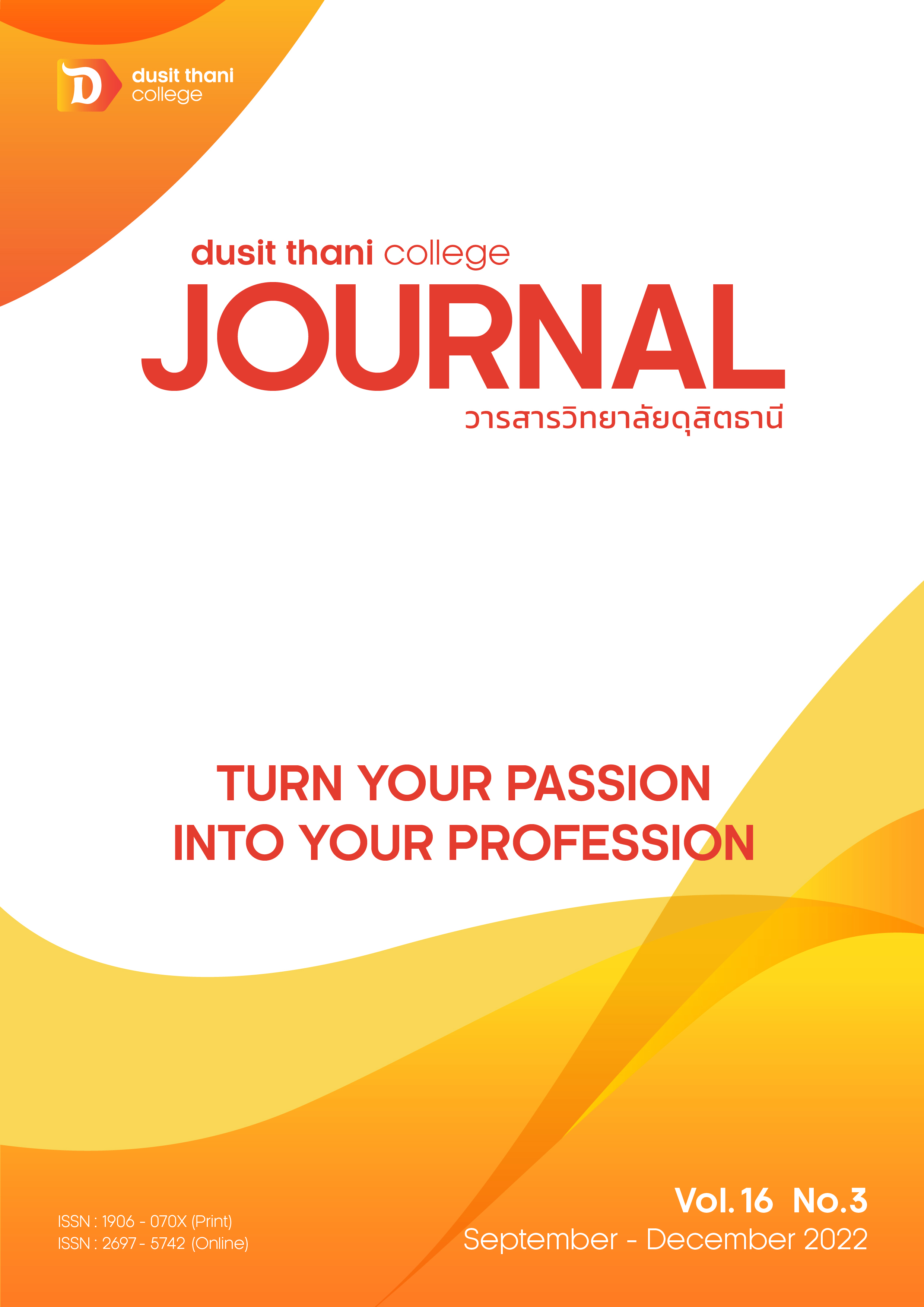ผลสัมฤทธิ์การเรียนรู้และความพึงพอใจของนักศึกษาด้วยห้องเรียนกลับด้านในรายวิชาสัมมนาการจัดการการท่องเที่ยวและการบริการ ระหว่างใช้ชีวิตแบบปกติใหม่
Main Article Content
บทคัดย่อ
งานวิจัยนี้มีวัตถุประสงค์ คือ 1) เปรียบเทียบผลสัมฤทธิ์ทางการเรียนของผู้เรียนในการสอนแบบห้องเรียนกลับด้านผ่าน Microsoft Teams และ 2) เพื่อประเมินความพึงพอใจของผู้เรียนที่มีต่อการสอนแบบห้องเรียนกลับด้านผ่าน Microsoft Teams ในรายวิชาสัมมนาการจัดการการท่องเที่ยวและการบริการ ในภาคการศึกษาที่ 1 ปีการศึกษา 2564 รูปแบบการวิจัยเป็นแบบผสมผสาน (เชิงปริมาณและเชิงคุณภาพ) กลุ่มประชากรในงานวิจัยครั้งนี้ได้แก่ นักศึกษาชั้นปีที่ 4 จำนวน 13 คน สาขาวิชาการจัดการการท่องเที่ยวและการบริการ คณะบริหารธุรกิจ มหาวิทยาลัยนอร์ท-เชียงใหม่ เครื่องมือที่ใช้ในงานวิจัย ประกอบด้วย แบบทดสอบความรู้ก่อน (Pre-test) - หลังการเรียน (Posttest) ประเด็นความรู้ความเข้าใจเรื่องการจัดสัมมนา แบบสังเกตแบบมีส่วนร่วม (Participant Observation) แบบสัมภาษณ์เชิงลึก (In-depth interview) และแบบวัดระดับความพึงพอใจของนักศึกษา วิเคราะห์ข้อมูลโดยการใช้สถิติ t-test การทดสอบเปรียบเทียบคะแนน แบบทดสอบความรู้ก่อน (Pre-test) กับแบบทดสอบความรู้หลังการเรียน (Posttest) โดยใช้สถิติการทดสอบที (t-test) แบบการวิจัยเชิงทดลองที่ต้องการเปรียบเทียบผลระหว่างก่อนทดลองกับหลังทดลอง (Dependent Sample) การวิเคราะห์ผลแบบสังเกตแบบมีส่วนร่วมและแบบสัมภาษณ์เชิงลึก ค่าเฉลี่ยและร้อยละ
ผลการศึกษาพบว่า 1) กระบวนการเรียนการสอนด้วยวิธีการจัดการเรียนรู้กิจกรรมห้องเรียนกลับด้านผ่าน Microsoft Teams ส่งผลให้นักศึกษามีค่าคะแนนที่ดีขึ้นทุกคน มีคะแนนเฉลี่ยเท่ากับ 9.08 ค่าเบี่ยงเบนมาตรฐานเท่ากับ 0.75 และเมื่อเปรียบเทียบระหว่างคะแนนก่อนและหลังเรียนพบว่า คะแนนสอบหลังเรียนของนักเรียนสูงกว่าก่อนเรียนอย่างมีนัยสำคัญ ทางสถิติที่ระดับ 0.05 (t = 31.22, sig. = 0.000) และ 2) ผลการประเมินความพึงพอใจ พบว่า ค่าเฉลี่ยของระดับความพึงพอใจของนักศึกษาอยู่ในระดับมากที่สุด โดยมีค่าเฉลี่ยเท่ากับ 4.3 และระดับความพึงพอใจของนักศึกษาที่มีรูปแบบการเรียนรู้แบบห้องเรียนกลับด้านด้วยห้องเรียนออนไลน์ Microsoft Teams อยู่ในระดับมากที่สุดด้วยเช่นกัน โดยมีค่าเฉลี่ยเท่ากับ 4.5 ข้อค้นพบที่โดดเด่นจากการสังเกตการณ์แบบมีส่วนร่วม (Participant Observation) คือ นักศึกษาเรียนรู้เรื่องการจัดสัมมนาทางวิชาการ ด้านการท่องเที่ยวออนไลน์จากการเข้าร่วมกิจกรรมจำนวน 3 ครั้งระหว่างการเรียนเนื้อหาตามช่วงเวลา โดยผู้วิจัยได้มอบหมายงานให้นักศึกษาทุกคน เรียนรู้รูปแบบการจัดสัมมนา การคิดรูปแบบกิจกรรม และข้อดี ข้อเสียของการจัดงานทั้ง 3 ครั้ง และร่วมกันคิดวิเคราะห์ แนวทางการแก้ไขและป้องกันปัญหา จึงทำให้นักศึกษาได้ทำกิจกรรมการเรียนรู้แบบห้องเรียนกลับด้านและในคาบเรียน โดยนำผลการวิเคราะห์มาพูดคุยและวางแผนเตรียมงานการจัดสัมมนาของตนเอง เพื่อป้องกันและควบคุมให้เกิดปัญหาน้อยที่สุด รวมทั้งฝึกการทำงานเป็นทีม รวมถึงจากการสัมภาษณ์เชิงลึกรายบุคคล (In-depth interview) พบว่า นักศึกษามีความเข้าใจและพึงพอใจอย่างมากในการจัดการเรียนรู้กิจกรรมห้องเรียนกลับด้านผ่านโปรแกรม Microsoft Teams ระหว่างใช้ชีวิตแบบปกติใหม่
Article Details

อนุญาตภายใต้เงื่อนไข Creative Commons Attribution-NonCommercial-NoDerivatives 4.0 International License.
นโยบายการพิจารณากลั่นกรองบทความ
- บทความวิจัยและบทความวิชาการทุกเรื่องที่จะได้รับการตีพิมพ์ต้องผ่านการพิจารณากลั่นกรองโดยผู้ทรงคุณวุฒิ (Peer Review) ในสาขาที่เกี่ยวข้อง จำนวน 3 ท่าน/บทความ
- บทความ ข้อความ ภาพประกอบและตารางประกอบที่ลงตีพิมพ์ในวารสารเป็นความคิดเห็นส่วนตัวของผู้เขียน กองบรรณาธิการไม่จำเป็นต้องเห็นด้วยเสมอไป และไม่มีส่วนรับผิดชอบใด ๆ ถือเป็นความรับผิดชอบของผู้เขียนแต่เพียงผู้เดียว
- บทความที่จะได้รับการตีพิมพ์จะต้องไม่เคยตีพิมพ์ เผยแพร่ที่ใดมาก่อน และไม่อยู่ระหว่างการพิจารณาของวารสารฉบับอื่น หากตรวจสอบพบว่ามีการตีพิมพ์ซ้ำซ้อน ถือเป็นความรับผิดชอบของผู้เขียนแต่เพียงผู้เดียว
- บทความใดที่ผู้อ่านเห็นว่าได้มีการลอกเลียนหรือแอบอ้างโดยปราศจากการอ้างอิง หรือทำให้เข้าใจผิดว่าเป็นผลงานของผู้เขียน กรุณาแจ้งให้กองบรรณาธิการวารสารทราบจะเป็นพระคุณยิ่ง
เอกสารอ้างอิง
Changkwanyeun, A. and Tsittiwong, T. (2016). The effects of flipped classroom and project based learning in the introduction to computer information science for undergraduate students. Proceedings of 12th Naresuan University Annual Conference: Research and innovation with national development. 1344-1353.
Chusilp, P. (1999). Science Evaluation Principles. Bangkok: Supervisory Unit Department of Training.
Kaeoluang, M. (2000). The study of customers' satisfaction with services of drugstores in Muang district, Chiangmai province. The degree of Master. Maejo University.
Kanjanapan, T. (2016). Effect of Flipped Classroom Approach on Biology Achievement, Self-Regulation and Instructional Satisfaction of the Grade 11 Students. The degree of Master. Prince of Songkla University.
Lerdkhum, S. (2019). The effect of inverted classroom-style learning management on learning achievement in science subjects for career development, business and services, and satisfaction with learning management of 2nd year vocational certificate students in the field of business computer. PAYAP Technological and Business College.
Marlowe, C.A. (2012). The Effect of the Flipped Classroom on Student Achievement and Stress. Montana State University. Retrieved November 26, 2015. (Online). Retrieved January 5, 2021 from http://scholarworks.montana.edu/xmlui/bitstream/heandle/1/1/1790/Marlowe0812.pdf?Sequence=1
Ministry of Education. (2003). National Education Act B.E. 2542 Amendment
(No. 2) B.E. 2545. Bangkok: Sri-Anant.
Phanit, W. (2015). Teachers for students create flipped classrooms. Bangkok: S. R. Printing Massproducts Company Limited.
Phetch Urai, W. (2015) Achievement of Flipped Classroom in Physical Properties of Rubber and Polymer for Undergraduate Student in Rubber and Polymer Technology Program. Faculty of Engineering and Agro-Industry, Maejo University.
Pongsawat, P. and Jeerungsuwan, N. (2017). The Instruction Design Flipped Classroom Model by Using WebQuest Activities to DevelopLearning Skills in The 21st Century for Students in Higher Education. Technical Education Journal King Mongkut’s University of Technology North Bangkok. 6 (1): 151-158.
Seubsom, K. and Meeplat, N. (2017). The Development of a Flipped classroom with the Integration of Multimedia Classroom Teaching through Google Classroom. APHEIT JOURNAL. 6 (2): 118-127.


